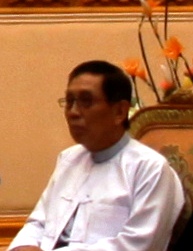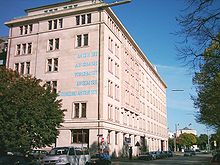
Middle Eastern studies is a name given to a number of academic programs associated with the study of the history, culture, politics, economies, and geography of the Middle East, an area that is generally interpreted to cover a range of nations including Egypt, Iran, Iraq, Israel, Jordan, Lebanon, Oman, Palestine, Saudi Arabia, Syria, Turkey, and Yemen. It is considered a form of area studies, taking an overtly interdisciplinary approach to the study of a region. In this sense Middle Eastern studies is a far broader and less traditional field than classical Islamic studies.

The Greater Middle East is a political term introduced in March 2004 in a paper published by the Carnegie Endowment for International Peace as part of the U.S. administration's preparatory work for the Group of Eight summit of June 2004. The area denotes a vaguely defined region called the "Arab world" together with Afghanistan, Iran, Pakistan, and Turkey with the speculation of including other Muslim-majority countries such as Indonesia, Bangladesh, and the Central Asian countries of Uzbekistan, Kazakhstan, Kyrgyzstan, Turkmenistan, and Tajikistan. The paper presented a proposal for sweeping change in the way the West deals with the Middle East and North Africa.
The International Strategic Research Organization is an independent think-tank established in 2004. It pursues interdisciplinary studies on national and international political, economic and security issues.
CrossAsia is an internet portal offering access to printed and electronic resources concerning Asian studies to individuals affiliated to a German institution which is part of the Blauer Leihverkehr. CrossAsia is being created and supervised by the East Asia Department of Berlin State Library, until 2015 the responsible library for East- and Southeast Asia (6,25) within the special research collection programme of the German Research Foundation. Information is presented as well in Latin as in Asian script.
Journal of Current Chinese Affairs is a German academic journal. The internationally refereed journal focuses on political, economic and social developments in the People's Republic of China, Hong Kong, Macau and Taiwan.
Journal of Current Southeast Asian Affairs is a German academic journal. The internationally refereed journal focuses on political, economic and social developments in Brunei, East Timor, Indonesia, Cambodia, Laos, Malaysia, Myanmar, the Philippines, Singapore, Thailand and Vietnam.

Ravindra Kumar is a Political Scientist, Peace Educator, an Indologist, a Humanist, Cultural Anthropologist and a former Vice-Chancellor of CCS University, Meerut (India).

Africa Spectrum is an interdisciplinary peer-reviewed academic journal concentrating on current development issues in Africa south of the Sahara. It is the only German academic journal exclusively devoted to Africa and is Platinum Open Access. Africa Spectrum is published three times a year by the GIGA Institute of African Affairs and was founded in 1966. The journal is part of the GIGA Journal Family of the GIGA-Institute of African Affairs (Deutsches Institut für Afrika-Forschung/Institute of African Studies within the German Institute for Global and Area Studies at. Issues starting from the year 1966 are available at JSTOR, with a three-year moving wall.

The Internet Library Sub-saharan Africa (ilissAfrica) is a German Internet portal that offers an integrated access to relevant scientific information resources in the field of African Studies and the region Africa South of the Sahara. ilissAfrica covers social sciences, history, philology, ethnology and cultural studies. The website is presented in German, English and French.
GIGA Journal Family is a publishing initiative of the German Institute for Global and Area Studies (GIGA) that brings together four international area studies journals. It comprises the GIGA journals Africa Spectrum, Journal of Current Chinese Affairs, Journal of Politics in Latin America, and Journal of Current Southeast Asian Affairs offering original research and empirical analysis on contemporary politics, society and economy of Africa, China, Latin America and Southeast Asia.

Leibniz-Zentrum Moderner Orient (ZMO) is a German research institute located in Berlin, Germany. The researchers focus on a comparative and interdisciplinary study of the Middle East, Africa, Eurasia, South and Southeast Asia. Central to its current research topics is the study of predominantly Muslim societies and their relations with non-Muslim neighbours. ZMO was founded in 1996 as an independent centre for the humanities, cultural and social sciences and is situated in the “Mittelhof”, which was designed by Hermann Muthesius, in Berlin-Nikolassee. Under the directorate of de:Ulrike Freitag, the centre is part of the association “Geisteswissenschaftliche Zentren Berlin e.V.”. The research programme has been funded by the Berlin Senate, the Deutsche Forschungsgemeinschaft (DFG) and the German Ministry for Education and Research. Since January 1, 2017 ZMO is part of the Leibniz Association.
Paul Johannes Kevenhörster is Professor Emeritus of Political Science at the Westphalian William's University of Muenster in Germany. His work focuses on politics in Japan, municipal government and international development co-operation. He has served in academia as well as in a government agency and as consultant to a variety of organisations. Since 1966 Paul Kevenhörster is married to Gisela Drerup. They have three daughters, Uta, Eva and Ina, three granddaughters and a grandson, Milla and Emma Kevenhörster, Sophie and Lucas Russell.

Sebastian Heilmann is a German political scientist and sinologist. He serves as the founding president of the Mercator Institute for China Studies (MERICS) in Berlin. Heilmann is a professor for the political economy of China at the University of Trier with many publications on China's political system, economic policy and international relations.

Elkhan Nuriyev is an Azerbaijani political scientist and a recognized expert in Eurasian affairs, including Russia, Eastern Europe, Caucasus and Central Asia.
The Frederick S. Pardee School of Global Studies is the international relations and public policy school of Boston University. It was officially established in 2014 by consolidating and renaming a number of long-established programs in international and regional studies at Boston University dating back to 1953. The current dean of the Pardee School is Scott D. Taylor, an American scholar of African politics and political economy, with a particular focus on business-state relations, private sector development, governance, and political and economic reform. The Pardee School has nearly 1,000 students, including about 800 undergraduate students. It offers six graduate degrees, two graduate certificates, five undergraduate majors, and seven undergraduate minors, and also brings together seven centers and programs of regional and thematic studies.

Aung Tun Thet is a Burmese economist, author, educator, and public speaker. He had worked in academia, government service, private sector and in the civil society. He has published over 30 books and writes regularly in the local press.
Lorenzo Kamel is Professor of Global History and History of the Middle East and North Africa at the University of Turin, director of the Istituto Affari Internazionalis Research Studies, and scientific director of the "New-Med Research Network".

Patrick Köllner is a German political scientist.

Matthias Basedau is a German political scientist and director of the GIGA Institute for African Studies in Hamburg.
Hager Ali is a German political scientist, university lecturer and freelance journalist. As research fellow at the German Institute for Global and Area Studies (GIGA) in Hamburg and freelance journalist, she has published articles on her research focusing on civil-military relations in authoritarian regimes in the Middle East and North Africa. She also communicates her research in German and international media, as well as in public events.












